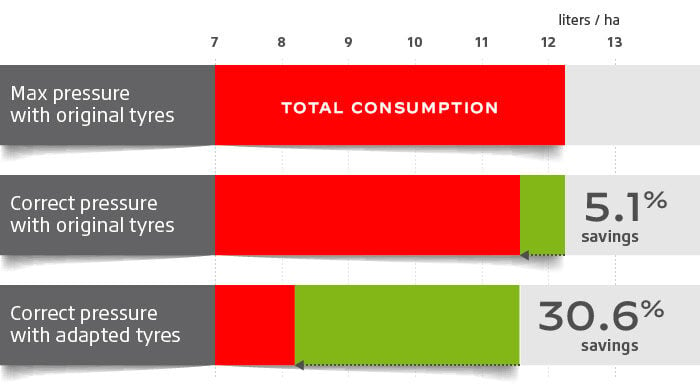Some tractor buyers had the bad experience of buying new tires to re-equip a new tractor due to damage or inefficiency. And sometimes, the negative consequences of bad tyre fitment are not visible but have a financial impact on the company, as this example shows.
Following Efficient20 test with a farmer in United Kingdom near from Ludlow, who purchased a John Deere 6910 135HP, with ploughing equipment.
520/85R38 and 420/85R28, over inflated (1,6 bar)
520/85R38 and 420/85R28, with the right pressure (1,2 bar)
650/65R38 and 540/65R28, with the right pressure (1 bar)

When buying a tractor, we focus on the machine and the main options, assuming that the rest goes without saying. We rely on common sense. But for tires, it's not so simple.
A tyre must be adapted to the load carried, the time spent on road and on field, farm activities,.. Tyre must be conform with your expectations: soil preservation, road holding, comfort,...
Depending of your farm activities and time spending on road and on field, “right” tyre must be completely different. As an example:
I need to adapt my pressure depending of load and speed
I only adapt my pressure in relation with load. I keep the same pressure at any speed. Compared to standard tyre, for the same load, I can reduce my pressure, or for the same pressure, I can increase the load, till 40% (depending of work conditions).
I only adapt my pressure in relation with load. I keep the same pressure at any speed. Only used on harvesting machine with cycling operations.
To learn more and boost your farm's profits, Bridgestone-Agriculture is offering you a free, detailed eBook that explains the essential role your agricultural tyres play in your productivity.
The most people who have read this article have also read the following articles, which are listed below in order of popularity:
This information is intended only to make you aware of the technical and functional aspects of agricultural tires and their use. It does not allow you to make a judgment or a definitive conclusion on a given problem. Only your agricultural tire expert is able to make a technical assessment and take a final decision, case by case.

BRIDGESTONE EUROPE NV/SA
AG Department
Leonardo Da Vincilaan 1
1930 Zaventem | Belgium
Our regional office:
Athena Drive, Tachbrook Park
Warwick CV34 6UX
United Kingdom